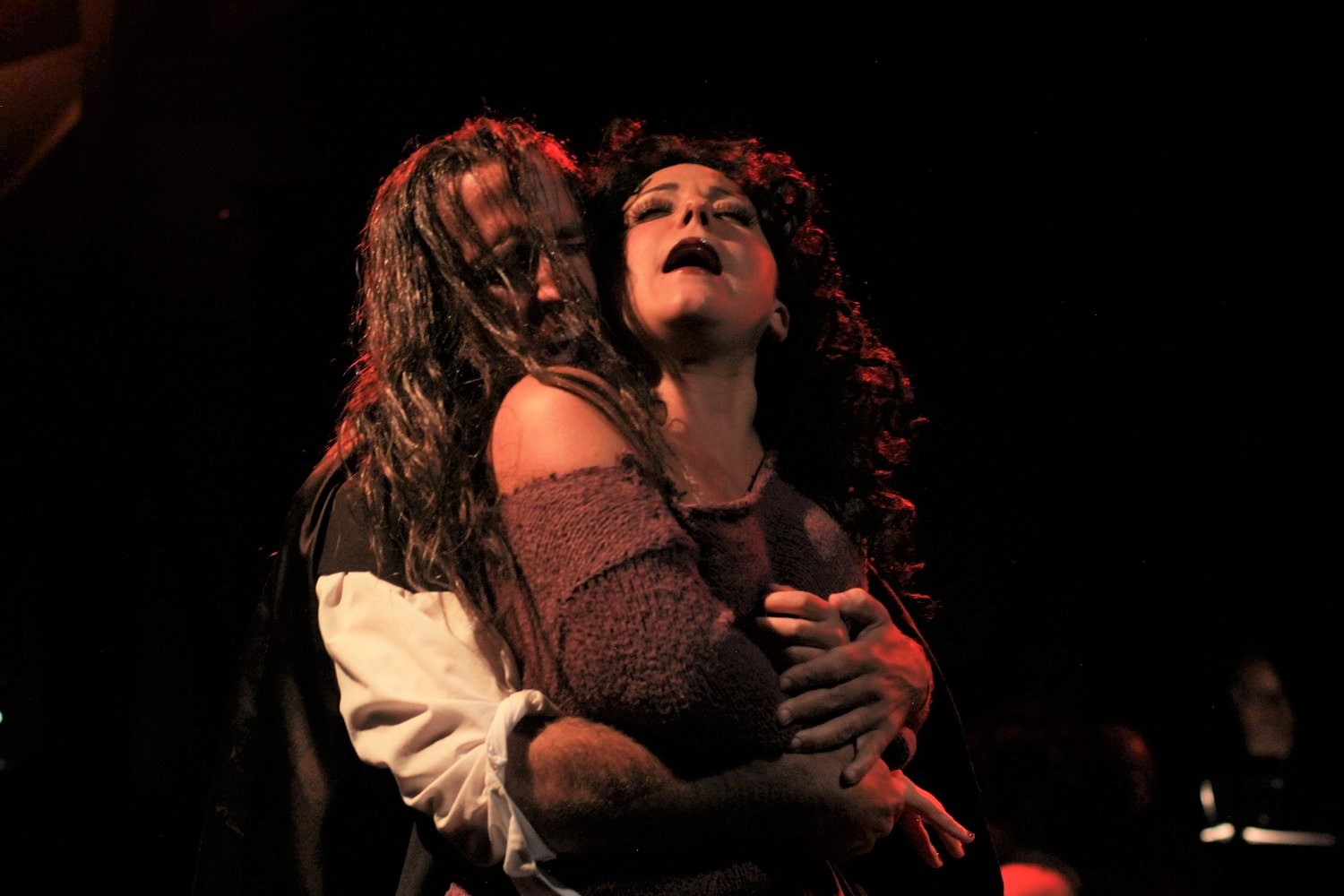Review of Cabaret, Music Theatre of Connecticut
As a musical, Cabaret has much to recommend it. The songs by John Kander (music) and Fred Ebb (lyrics) are catchy and full of the charm of the demimonde. Joe Masteroff’s book manages to provide romance while capturing the risks of bohemia and the shock of the rise of Nazism. The story unfolds as a bitter lesson on several fronts, and yet, like its showman of an emcee, it manages to be engaging until all is lost. Played again—in MTC’s second staging of Cabaret—by Eric Scott Kincaid, The Emcee seems less a Mephistophelean overseer of the fortunes of the other characters and more like the portrait of Dorian Gray, suffering more the uglier the situation in Berlin grows. Kincaid’s Emcee looks tortured and tired from the start, an emblem of the Kit Kat Klub’s seediness and its losing effort to deny its days are numbered.
The Emcee (Eric Scott Kincaid) in Music Theatre of Connecticut’s Cabaret, directed by Kevin Connors
The show has a small cast, so there aren’t quite the big dance numbers we might expect, which also gives a realness to a Kit Kat Klub that lacks the glitz and sparkle of Broadway versions. The opening “Willkommen” has plenty of energy, and the dancers are close enough to flirt with audience members or to upbraid them for not flirting enough. Two male dancers, Tony Conaty and Alex Drost, provide the requisite Fossean physicality, and Hillary Ekwall, who plays Fräulein Kost, does a mean split.
Fräulein Kost (Hillary Ekwall), The Emcee (Eric Scott Kincaid), Man 2 (Tony Conaty)
The droll numbers—like “Two Ladies”—have a tawdriness that showcases the unreality of the romance between pining British showgirl Sally Bowles (Desirée Davar) and straitlaced American writer Cliff Bradshaw (Nicolas Dromard). The romance between timid Jewish fruiterer Herr Schultz (Jim Schilling) and pragmatic German landlady Fräulein Schneider (Anne Kanengeiser) has perhaps a better chance of enduring, but that’s where the menace of the rising Nazis becomes most keenly felt. As Ernst Ludwig, Cliff’s student of English lessons, Andrew Foote is disarmingly friendly, even after everyone notices his armband, but as the edicts against Jews escalate, we know there will be violence.
Sally Bowles (Desirée Davar)
As the irrepressible Sally Bowles, Desirée Davar sounds remarkably like Liza Minelli, the most famous Sally, in the big numbers “Maybe This Time” and “Cabaret.” Davar is better in Act II, when emotions begin to take their toll, than she is as the bubbly, flirtatious Sally of Act I. As Cliff, Dromard is also best in Act II, when he begins to see what’s at stake. To Fräulein Schneider falls such great numbers as “So What?” in Act I and “What Would You Do?” in Act II, both trenchant expressions of a life with no illusions and not many choices, but their fatalism exposes the quietism that let the Nazis have their way. Kanengeiser plays the part perfectly, giving the aging fräulein a weary wit. Jim Schilling’s Herr Schultz is a nice match for her. He’s touching in his wooing, and their duet, “Married,” is a fragile, lyrical moment. His insistence that Nazism will pass because “I know the Germans and, after all, what am I? A German” acts as a sad reminder of how deluded even a Jewish merchant could be.
Fräulein Schneider (Anne Kanengeiser), Herr Schultz (Jim Schilling)
Some of the popular songs featured in the film and in other iterations—such as “Money” and “Mein Herr”—are not here, as they weren’t in the initial version of the musical. Instead, “Sitting Pretty” and “Don’t Tell Mama,” both less jaunty, fill those spaces. This is a more chastened Cabaret, and its powerful ending stabs not only with the sorrow that no one gets what they want but with how horribly correct the Nazis were in singing “Tomorrow Belongs to Me” (here greatly helped by the singing voice of Andrew Foote, who played Jekyll/Hyde with such power earlier this season). Against the Nazis brutal will to power, the call to “come to the Cabaret” is desperate, and Sally’s insistence that she’s “going out like Elsie,” her roommate who ended her life rather than live in an uncaring world, is apropos to the fates we see visited upon Herr Schultz and The Emcee.
The Emcee (Eric Scott Kincaid)
Somber in mood, Kevin Connors’ production of Cabaret is all-too appropriate to times when denial and dancing away a sense of doom are endemic. In that sense, one hopes life isn’t a Cabaret.
Cabaret
Book by Joe Masteroff
Based on the play by John Van Druten and stories by Christopher Isherwood
Music by John Kander, Lyrics by Fred Ebb
Directed by Kevin Connors
Musical Direction: Thomas Conroy; Scenic Design: Kelly Burr Nelson; Lighting Design: RJ Romeo; Costume Design: Diane Vanderkroef; Sound Design: Will Atkin; Prop Design: Merrie Deitch; Choreography: Simone DePaolo; Fight Staging: Dan O’Driscoll; Stage Manager: Gary Betsworth
Cast: Tony Conaty, Desirée Davar, Nicolas Dromard, Alex Drost, Hillary Ekwall, Andrew Foote, Anne Kanengeiser, Eric Scott Kincaid, Jim Schilling
Music Theatre of Connecticut
March 29-April 14, 2019









